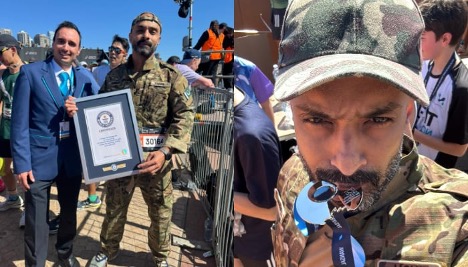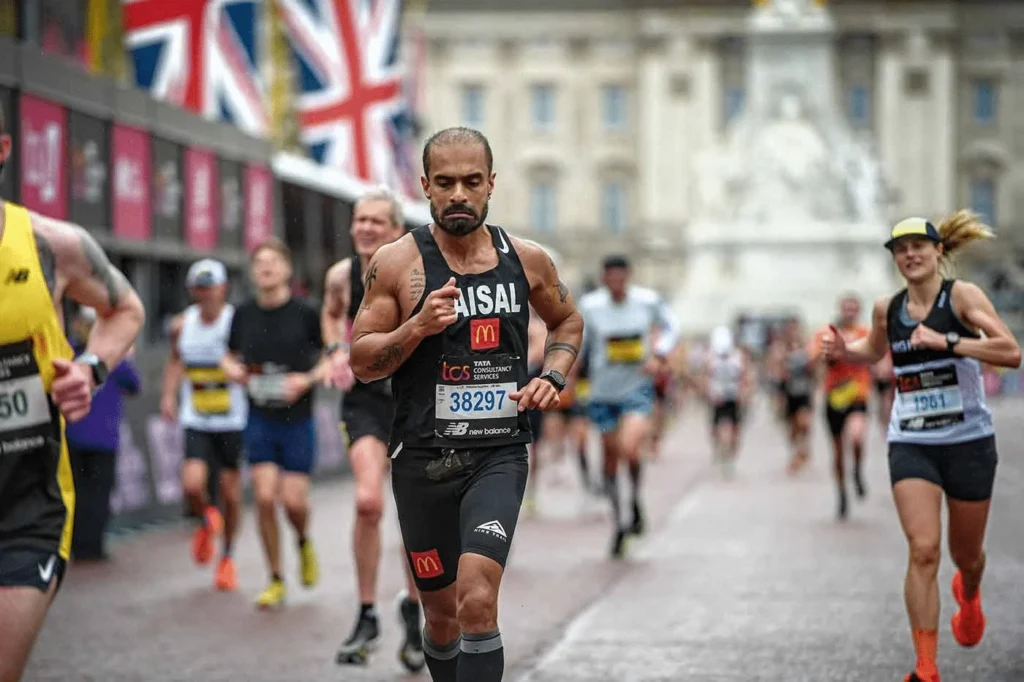He was not born on a finish line, nor did the story open with medals clinking in his name. Faisal Shafi’s saga begins in the muted light of Karachi, in 2017, when he looked into the mirror and saw not the champion he would become, but the weight of struggle pressing against his chest. What started as a personal battle with fitness, sweat dripping on the ground of a gym, lungs burning through an obstacle course, was the prologue to something larger, something that even he did not yet see: the road.
By 2019, that road stretched to Dubai, hot as a furnace, merciless as steel, where for the first time he pinned a bib to his chest and tested himself against the marathon’s 42.195 kilometers. The clock stopped at 3 hours, 45 minutes. For some, just a number. For him, it was ignition, the first scene of a destiny that had just rolled its opening credits.
The Rise of a Marathon Pioneer
From there, the story picked up pace. He did not just run marathons; he stormed them, one by one. Tokyo, Boston, London, Berlin, Chicago, New York, each city another battleground, each finish line another flag planted. He became the first Pakistani to claim all six Abbott World Marathon Majors, and when Sydney entered the elite circle in 2024, he chased it too. By 2025, he was no longer just a runner; he was a Seven Finisher, one of the rare few on Earth to hold that title. Yet medals were never just medals for him; they were scars of effort, etched into his legs, carved into his will.
Breaking Barriers in Berlin
Berlin, 2023, the camera lingers here. Rain glistens on the streets, the crowd is a blur, and Faisal Shafi’s face is set like stone. He does not chase other runners; he chases time itself. When he crosses in 2 hours, 58 minutes, and 9 seconds, breaking the mythical three-hour barrier, it feels like a cinematic explosion, the soundtrack swelling. The boy who once ran to lose weight now ran like a craftsman sculpting history. But his story was not only about speed, it was about symbols. He wanted each race to speak a language larger than pace.
The Boston Statement
Cut to Boston, April 2025. The city wakes to cheers, but in the river of neon singlets and carbon shoes, two men stand out. Faisal Shafi and Danish Elahi, draped in Pakistan’s shalwar kameez, step onto the start line. To the world, it looks absurd, forty-two kilometers in heavy fabric, stitched for tradition, not sport. But the gun fires, and they move. The fabric clings, sweat soaks, the wind resists, but their rhythm does not break. Hours later, the finish line roars as they cross in 3 hours and 26 minutes. Guinness World Records confirms it: the first men to conquer Boston under four hours in national attire. The crowd sees runners. Faisal knows he has just turned fabric into a flag.
Sydney: The Cinematic Climax
Then the frame shifts to Sydney, August 2025. This is not just another marathon; it is the climax. The inaugural Sydney Marathon, thousands on the streets, but one figure catches the eye. Shafi wears a military uniform, not for spectacle, but as a tribute to the Pakistan Army. It weighs heavily, the fabric sticks, and the sun turns the outfit into an oven.

His legs fight the resistance, his lungs beg for release, but his stride is steady, his gaze locked forward. The uniform is not just cloth; it is memory, duty, and sacrifice. At 3 hours, 40 minutes, and 13 seconds, Faisal Shafi collapses past the finish line, another Guinness World Record written under his name: the fastest marathon in military attire. In that moment, the uniform is not restricting him; it is propelling him, as if every soldier’s spirit has run with him. After the marathon, he also said:
“It was an ideal time to pay tribute to Pakistan’s armed forces, our martyrs, and the immense sacrifices of our soldiers.”
The tape does not break like ribbon; it unfurls like a nation’s banner. The camera pans out. Behind him, 36 Pakistanis, 10 of them women, run that same Sydney race. Sixteen finish under four hours. A movement is stirring, one marathoner inspiring dozens, dozens inspiring hundreds. Yet behind the heroic framing lies the off-screen struggle.
Pakistan offers no elite facilities, no federation handholding, no system to churn out marathoners. Every race meant money scraped, logistics fought, lonely miles trained in climates that punished more than they prepared. And when Faisal Shafi chose to run in shalwar kameez or in uniform, these were not theatrical choices; they were burdens deliberately embraced, suffering carried as a message.
But that is what makes the story cinematic, because he turned pain into poetry. At 41, when recovery slows and ambition wanes for most, Faisal Shafi’s script only sharpened. He ran for more than finish times; he ran as a soldier without a gun, a storyteller without a pen, a flag-bearer without a pole. His Guinness World Records, his Seven Star crown, his records on the streets of Berlin, Boston, and Sydney they are not just milestones. They are acts in a thriller where one man’s footsteps echoed louder than a stadium’s cheer.
And when the final credits roll, Faisal Shafi is not simply an athlete. He is a man who turned marathons into cinema, each stride a frame, each finish line a climax, and each medal a symbol that Pakistan, too, could run shoulder to shoulder with the world.
Also Read: Scars into Stars: Haider Ali’s Journey


